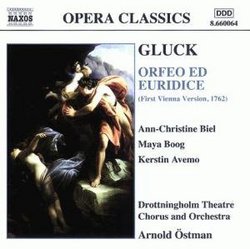| All Artists: Gluck, Biel, Boog, Avemo, Ostman Title: Orfeo Ed Euridice Members Wishing: 0 Total Copies: 0 Label: Naxos Release Date: 8/20/2002 Genre: Classical Style: Opera & Classical Vocal Number of Discs: 1 SwapaCD Credits: 1 UPC: 730099606424 |
Search - Gluck, Biel, Boog :: Orfeo Ed Euridice
 | Gluck, Biel, Boog Orfeo Ed Euridice Genre: Classical
|
Larger Image |
CD Details |
CD ReviewsGluck's Orfeo and Euridice on Naxos Robin Friedman | Washington, D.C. United States | 07/19/2004 (5 out of 5 stars) "Gluck's "Orfeo and Euridice" is a venerable and treasured work. It is one of the earliest operas to retain its place in the repertoire.The composer, Christoph Willbald Gluck (1714-1787), was one of music's true revolutionaries. He changed the character of opera from a vehicle for florid showpieces for vocalists to a drama in which the music illuminated and made a partnership with the text. Gluck's three revolutionary operas, Orpheo, Alceste, and Paris and Helena were written in Vienna from 1762-1770 in close collaboration with the liberettist, Ranieri d'Calabigi, in one of the most eventful collaborations in music history. Of these three operas, the best-known by far is Orpheo and Euridice,first written in 1762. The performance of Orfeo on this CD is by the Drottningholm Theatre Chorus and Orchestra conducted by Arnold Ostman. Ostman and the Drottningholm have also produced a commendable CD of Alceste on Naxos, using Gluck's rarely performed original version of 1767. The version of Orfeo on this disk, likewise, is the initial Vienna version of 1762. There are recordings of several other versions available -- including Gluck's revision of his score in Paris in 1774, and editions by later composers, including Hector Berlioz.Orfeo ed Euridice is a work of both passion and simplicity which never fails to move me in live performances or on recordings. The work is based upon a Greek myth in which Orpheus, grieving over the death of his wife, is given the opportunity to win her from the depths of Hades on conditions that he not look at her until the couple returns to earth and that he not disclose this condition to her. Orfeo's gift of song tames the spirits of Hades but, alas, the couple cannot keep the condition and Euridice dies again. The opera ends happily with Euridice's life restored a second time as a tribute to Orfeo's faithfulness.The story speaks of the power of human love and of the power of art to redeem life. Gluck's music is equal to his themes. There are only three characters in the opera, all of whom generally are sung by women. On this CD, Orfeo is performed by Ann-Christine Biel, Euridice by Maya Boog, and Amor by Kerstin Avemo. There is also a large choral part and orchestral interludes. Each aria in this opera is devoted to the portrayal of a specific emotion to illuminate the drama. Thus the opera presents a unique mixture of simplicity, rationalism, and passion. The passionate, emotional character of this music is too frequently overlooked.The strongest parts of the performance on this CD are the orchestra and the chorus. The orchestral sections are played on period instruments and the winds and percussion come through beautifully. The music sounds more transparent that is generally the case. The chorus also performs beautifully in the opening and concluding scenes and in the second act where Orfeo tames the spirits of the underworld.Ann-Christine Biel has an unusual voice and performs well in the role of Orfeo. Her voice is light but with a burnished tone as well and, most of the time, it is moving. The most famous moment in Orpheo is the aria "Che faro senza Euridice" (what shall I do without Euridice) which Orfeo sings near the end of the opera, after, seemingly, losing his love for the second time. This is one of the greatest moments in any opera, and Ms. Biel performs the aria well. Kertin Avemo has a light voice for her role as Amor and Maya Boog is a fine Euridice.The performance on this CD is unusually short running just over one hour. This is probably due to using Gluck's original 1762 score without embellishment. For those listeners unfamiliar with Gluck, this CD gives an excellent account of this revered music at a budget price. For those who already love this music, this disk will prove a compliment to the many other outstanding recordings available of this great opera." Time and place, not "just" music Robin Friedman | 12/18/2003 (5 out of 5 stars) "This recording of "Orfeo ed Euridice", though not the first 'historically informed' interpretation of 18th century European music I'd heard, was the most pivotal for me. Ostman and team (I attribute the unique results to all contributors, recordists as much as performers) have created with this recording a very special 'sound painting'. Period venue and instuments alone cannot account for the erie, 'sepia photo' feel imparted to the music. You simply must hear it and be transported to the underwordly time and place that Ostman surely intended to convey.The orchestra often sounds to me like an enormous harmonium; the instrumentalists play with appreciably no vibrato throughout the performance. I love this sound whether the interpretation is true to Gluck's time or not. So honest and beautiful. Ostman also uses this approach successfully in a recording of Gluck's "Alceste".As a sound and music lover I highly recommend this recording."
|

 Track Listings (41) - Disc #1
Track Listings (41) - Disc #1